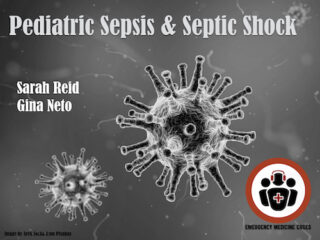Most Recent
Episode 51 Effective Patient Communication – Managing Difficult Patients
If you believe that coping with some of the people we deal with in emergency medicine is difficult or impossible, you’re not alone. We all feel this way from time to time. Managing difficult patients can be a challenge to the health care provider and to the entire ED. The hostile aggressive patient, the demanding patient, the know-it-all, the excessively anxious patient, and the incessant complainer, are some of the folks that we need to know how to manage effectively. If we fail to handle these patients appropriately, they may receive suboptimal care, grind patient flow to a halt, and delay care of other patients. If the staff has to deal with a multitude of these patients on a given shift, there’s a sort of swarm-based escalation in frustration and sometimes, unfortunately, a total breakdown of effective patient communication and care. But don't fret. In this one-of-a-kind podcast on effective patient communication and managing difficult patients, Dr. Walter Himmel, Dr. Jean-Pierre Champagne and RN Ann Shook take us through specific strategies, based on both the medical and non-medical literature, on how we can effectively manage these challenging patients. As a bonus, we address the difficult situation of breaking bad news with a simple mnemonic and discuss tips on how to deliver effective discharge instructions to help improve outcomes once your patient leave the ED.
Best Case Ever 29: Drug Induced Aseptic Meningitis
Dr. David Carr presents his third of EM Cases' Carr's Cases. This series features potentially debilitating diagnoses that may be thought of as 'zebras', but actually have a higher incidence then we might think - and if diagnosed early, can significantly effect patient outcomes. Dr. Carr tells the story of young woman with an MRSA supra pateller abscess who was put on trimethoprim sulfamethoxazole and presents looking very ill with a severe headache. Not only has trimethoprim sulfamethoxazole been implicated in aseptic meningitis, but NSAIDS, immunomodulators and antibiotics have also been implicated. The reason this is so important for ED practitioners to know, is that case reports of drug-induced aseptic meningitis have shown that symptoms will resolve completely within 24 hours, once the offending drug has been stopped. Not only that, but if the patient receives the drug again in the future, they are at risk for a more severe case of drug induced aseptic meningitis.
Journal Jam 1: Age Adjusted D-dimer with Jeff Kline and Jonathan Kirschner
In this first ever episode of the Journal Jam podcast, a collaboration between EM Cases, Academic Life in EM and The Annals of Emergency Medicine's Global Emergency Medicine Journal Club, Teresa Chan and I, along with Jeff Kline, Jonathan Kirschner, Anand Swaminathan, Salim Rezaie and Sam Shaikh from ALiEM, discuss the potential for Age Adjusted D-dimer to rule out pulmonary embolism in low risk patients over the age of 50. We discuss 4 key questions about the ADJUST-PE Study from JAMA in March 2014 including: Would you order a CTPA on a 60 year old woman with an age adjusted D-dimer of 590 ng/L? The problem until now has been that the older the patient, the more likely the D-dimer is to be positive whether they have a PE or not, so many of us have thrown the D-dimer out the window in older patients and go straight to CTPA, even in low risk patients. If you are a risk averse doc, this strategy will lead to over-utilization of resources, huge costs, length of stay, radiation effects etc; and if you’re not so risk averse, then you might decide not to work up the low risk older patient at all and miss clinically important PEs. expert peer reviewFor all the questions discussed on this podcast, the original Google Hangout interview from which this podcast was based, and the crowd sourced opinions from around world, visit the ALiEM website. Many thanks to all the talented people who made this podcast possible. Together, we're smarter!
Episode 50 Recognition and Management of Pediatric Sepsis and Septic Shock
Kids aren't little adults. Pediatric sepsis and septic shock usually presents as 'cold shock' where as adult septic shock usually presents as 'warm shock', for example. In this episode, a continuation of our discussion on Fever from with Ottawa PEM experts, Sarah Reid and Gina Neto, we discuss the pearls and pitfalls in the recognition and management of pediatric sepsis and septic shock. We review the subtle clinical findings that will help you pick up septic shock before it's too late as well as key maneuvers and algorithms to stabilize these patients. We cover tips for using IO in children, induction agents of choice, timing of intubation, ionotropes of choice, the indications for steroids in septic shock, and much more.....
Episode 49 Effective Patient Communication, Patient Centered Care and Patient Satisfaction
If you believe that coping with some of the people we deal with in emergency medicine is difficult or impossible, you’re not alone. We all feel this way from time to time. We all work in stressful environments where it may feel as though we have too little time for effective patient communication, patient centered care and patient satisfaction. You and your patients may often have mismatched views of what’s important. You may have a specific medical agenda and they might have a very different agenda. Then there’s the difficult patient – we all know who these people are – the hostile aggressive patient, the demanding patient, the know-it-all, the excessively anxious patient, and the incessant complainer, among others. If we don’t know how to handle these patients appropriately, they may receive suboptimal care, grind patient flow to a halt, and delay care of other patients. And of course, if the staff has to deal with a multitude of these patients on a given shift, there’s a sort of swarm-based escalation in frustration and sometimes, unfortunately, a total breakdown of effective care. These frustrations don’t only come out when we’re presented with multiple sequential difficult patients, but for some of us, the more we practice, the more we become desensitized to the needs of all of our patients and their families and, we run the risk of destroying the doctor-patient relationship, as well as making most of our patient interactions frustrating, unsatisfying, – even detrimental to our health and the outcomes of our patients. How you communicate in the ED can improve patient outcomes and enhance job satisfaction, yet there is little education on patient centered care for EM practitioners. After listening to this episode, it is my hope that what you learn from the literature and from expert opinion,and then apply to the way you communicate with your patients, will effectively make you a happier health care professional. Dr.Walter Himmel, Dr. Jean Pierre Champagne and RN Ann Shook guide us in this round table discussion on effective patient communication, patient centered care and patient satisfaction – this has evolved my practice into what I perceive as a higher level of personal satisfaction as well as patient care….I hope it will do the same for you.
Best Case Ever 28: Anti-NMDA Receptor Encephalitis
Dr. David Carr presents his second of Carr's Cases. This series features some potentially life-threatening diagnoses that may be perceived as zebras, but actually have a higher incidence then we might think - and if diagnosed early, can significantly effect patient outcomes. This Best Case Ever is about Anti-NMDA Receptor Encephalitis, a diagnosis that was only discovered in 2005, and has only recently been recognized by the Emergency Medicine community. Anti-NMDA Receptor Encephalitis may mimic a first presentation of schizophrenia or Neuraleptic Malignant Syndrome. It may present with seizure, altered mental status, autonomic instability or movement disorder in the absence of drug exposure. When you are faced with any of these presentations and no other diagnosis seems to fit, do an LP and send the CSF for anti-NMDA receptor antibodies. The time-sensitive treatment is IVIG and steroids. Anti-NMDA receptor Encephalitis is a must know diagnosis for all emergency medicine practitioners. Learn how to pick up this important diagnosis by listening to Dr. Carr's Best Case Ever and following the links to further resources.







